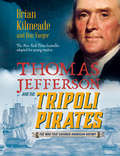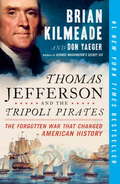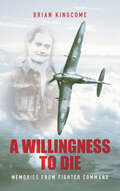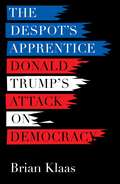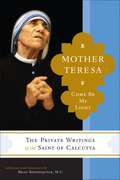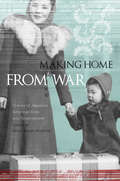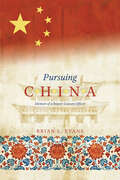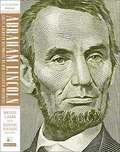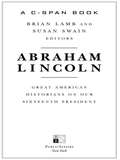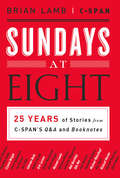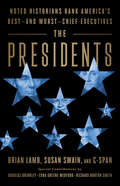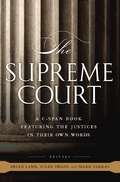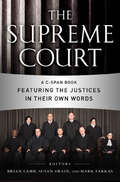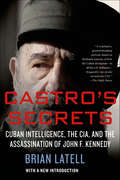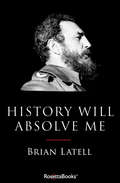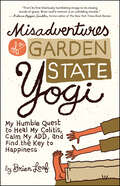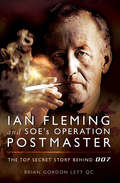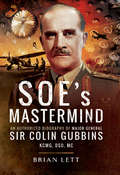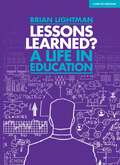- Table View
- List View
Thomas Jefferson and the Tripoli Pirates (Young Readers Adaptation)
by Brian Kilmeade Don YaegerA page-turning middle-grade adaptation of the New York Times bestseller about how a newly independent nation was challenged by foreign powers and what happened when America's third president decided to stand up to intimidation.When Thomas Jefferson became president in 1801, America was deeply in debt and needed its economy to grow quickly, but its merchant ships were under attack. Pirates from North Africa routinely captured American sailors and held them as captives demanding ransom and tribute far beyond what the new country could afford.Jefferson found it impossible to negotiate a truce, and decided to move beyond diplomacy. He sent the U.S. Navy and Marines to blockade Tripoli--launching the Barbary Wars and beginning America's journey toward future superpower status.This vivid and accessible young readers adaptation of the New York Times bestseller features an exclusive new introduction, extensive back matter, and eye-catching art throughout. Chronicling a crucial moment in American history, this historical thriller will excite and inspire the next generation of patriots.
Thomas Jefferson and the Tripoli Pirates: The Forgotten War That Changed American History
by Brian Kilmeade Don Yaeger"Another blockbuster! Thomas Jefferson and the Tripoli Pirates reads like an edge-of-your-seat, page-turning thriller. You will love this book and also wonder why so few people know this story. No one captures the danger, intrigue, and drama of the American Revolution and its aftermath like Brian Kilmeade and Don Yaeger." --Brad ThorThis is the little-known story of how a newly independent nation was challenged by four Muslim powers and what happened when America's third president decided to stand up to intimidation. When Thomas Jefferson became president in 1801, America faced a crisis. The new nation was deeply in debt and needed its economy to grow quickly, but its merchant ships were under attack. Pirates from North Africa's Barbary coast routinely captured American sailors and held them as slaves, demanding ransom and tribute payments far beyond what the new country could afford. Over the previous fifteen years, as a diplomat and then as secretary of state, Jefferson had tried to work with the Barbary states (Tripoli, Tunis, Algiers, and Morocco). Unfortunately, he found it impossible to negotiate with people who believed their religion justified the plunder and enslavement of non-Muslims. These rogue states would show no mercy--at least not while easy money could be made by extorting the Western powers. So President Jefferson decided to move beyond diplomacy. He sent the U.S. Navy's new warships and a detachment of Marines to blockade Tripoli--launching the Barbary Wars and beginning America's journey toward future superpower status. As they did in their previous bestseller, George Washington's Secret Six, Kilmeade and Yaeger have transformed a nearly forgotten slice of history into a dramatic story that will keep you turning the pages to find out what happens next. Among the many suspenseful episodes: ·Lieutenant Andrew Sterett's ferocious cannon battle on the high seas against the treacherous pirate ship Tripoli. ·Lieutenant Stephen Decatur's daring night raid of an enemy harbor, with the aim of destroying an American ship that had fallen into the pirates' hands.·General William Eaton's unprecedented five-hundred-mile land march from Egypt to the port of Derne, where the Marines launched a surprise attack and an American flag was raised in victory on foreign soil for the first time. Few today remember these men and other heroes who inspired the Marine Corps hymn: "From the Halls of Montezuma to the Shores of Tripoli, we fight our country's battles in the air, on land and sea." Thomas Jefferson and the Tripoli Pirates recaptures this forgotten war that changed American history with a real-life drama of intrigue, bravery, and battle on the high seas.
Thomas Jefferson and the Tripoli Pirates: The Forgotten War That Changed American History
by Brian Kilmeade Don Yaeger"Another blockbuster! Thomas Jefferson and the Tripoli Pirates reads like an edge-of-your-seat, page-turning thriller. You will love this book and also wonder why so few people know this story. No one captures the danger, intrigue, and drama of the American Revolution and its aftermath like Brian Kilmeade and Don Yaeger." --Brad ThorThis is the little-known story of how a newly independent nation was challenged by four Muslim powers and what happened when America's third president decided to stand up to intimidation. When Thomas Jefferson became president in 1801, America faced a crisis. The new nation was deeply in debt and needed its economy to grow quickly, but its merchant ships were under attack. Pirates from North Africa's Barbary coast routinely captured American sailors and held them as slaves, demanding ransom and tribute payments far beyond what the new country could afford. Over the previous fifteen years, as a diplomat and then as secretary of state, Jefferson had tried to work with the Barbary states (Tripoli, Tunis, Algiers, and Morocco). Unfortunately, he found it impossible to negotiate with people who believed their religion justified the plunder and enslavement of non-Muslims. These rogue states would show no mercy--at least not while easy money could be made by extorting the Western powers. So President Jefferson decided to move beyond diplomacy. He sent the U.S. Navy's new warships and a detachment of Marines to blockade Tripoli--launching the Barbary Wars and beginning America's journey toward future superpower status. As they did in their previous bestseller, George Washington's Secret Six, Kilmeade and Yaeger have transformed a nearly forgotten slice of history into a dramatic story that will keep you turning the pages to find out what happens next. Among the many suspenseful episodes: ·Lieutenant Andrew Sterett's ferocious cannon battle on the high seas against the treacherous pirate ship Tripoli. ·Lieutenant Stephen Decatur's daring night raid of an enemy harbor, with the aim of destroying an American ship that had fallen into the pirates' hands.·General William Eaton's unprecedented five-hundred-mile land march from Egypt to the port of Derne, where the Marines launched a surprise attack and an American flag was raised in victory on foreign soil for the first time. Few today remember these men and other heroes who inspired the Marine Corps hymn: "From the Halls of Montezuma to the Shores of Tripoli, we fight our country's battles in the air, on land and sea." Thomas Jefferson and the Tripoli Pirates recaptures this forgotten war that changed American history with a real-life drama of intrigue, bravery, and battle on the high seas.
A Willingness to Die: Memories from Fighter Command
by Brian KingcomeIn 1938 Brian Kingcome joined the RAF with a permanent commission and was posted to No 65 Fighter Squadron at Hornchurch, soon to be equipped with the Spitfire, and so it came about that Brian flew the Spitfire throughout the war. He became acting CO for No 92 Squadron at Biggin Hill and led over sixty operations, achieving the highest success rate of any squadron in the Battle of Britain. In May 1943 Brian joined Desert Air Force in Malta and took command of 244 Wing. At this time he was confirmed Flight Lieutenant, acting Squadron Leader, acting Wing Commander and at twenty-five was one of the youngest Group Captains in the Royal Air Force. Brian Kingcome may have been the last Battle of Britain pilot of repute to put his extraordinary story into print; looked upon by other members of his squadron as possibly their finest pilot, his nonetheless unassuming memoirs are related with a subtle and compassionate regard for a generation who were, as he felt, born to a specific task. Brian's memoirs have been edited and introduced by Peter Ford, ex-National Serviceman in Malaya.
The Despot's Apprentice: Donald Trump's Attack on Democracy
by David Talbot Brian Klaas”[A] primer on the threat to democracy posed by—and I can’t believe I’m saying this—the current president of the United States.”—David Litt, New York Times bestselling authorDonald Trump isn’t a despot. But he is increasingly acting like The Despot’s Apprentice, an understudy in authoritarian tactics that threaten to erode American democracy, including:Attacking the pressThreatening rule of law by firing those who investigate his alleged wrongdoingsUsing nepotism to staff the White Houseand countless other techniquesDonald Trump is borrowing tactics from the world’s dictators and despots. Trump’s fascination with the military, his obsession with his own cult of personality, and his deliberate campaign to blur the line between fact and falsehood are nothing new to the world of despots. But they are new to the United States. With each authoritarian tactic or tweet, Trump poses a unique threat to democratic government in the world’s most powerful democracy.At the same time, Trump’s apprenticeship has serious consequences beyond the United States. His bizarre adoration and idolization of despotic strongmen—from Russia’s Putin, to Turkey’s Erdogan, or to the Philippines’ Duterte—has transformed American foreign policy into a powerful cheerleader for some of the world’s worst regimes.In The Despot’s Apprentice, an ex-US campaign advisor who has sat with the world’s dictators explains Donald Trump’s increasingly authoritarian tactics and how Trump uniquely threatens American democracy... and how to save it from him.
Mother Teresa: The Private Writings of the Saint of Calcutta
by Mother Teresa Brian KolodiejchukThis historic work reveals the inner spiritual life of one of the most beloved and important religious figures in history. During her lifelong service to the poorest of the poor, Mother Teresa became an icon of compassion to people of all religions; her extraordinary contributions to the care of the sick, the dying, and thousands of others nobody else was prepared to look after has been recognized and acclaimed throughout the world.
Making Home from War: Stories of Japanese American Exile and Resettlement
by Brian Komei DempsterThe sequel to the award-winning From Our Side of the Fence—personal stories of life after the WWII internment camps from twelve Japanese Americans. Many books have chronicled the experience of Japanese Americans in the early days of World War II, when over 120,000 persons of Japanese ancestry, two-thirds of whom were American citizens, were taken from their homes along the West Coast and imprisoned in concentration camps. When they were finally allowed to leave, a new challenge faced them—how do you resume a life so interrupted? Written by twelve Japanese American elders who gathered regularly at the Japanese Cultural and Community Center of Northern California, Making Home from War is a collection of stories about their exodus from concentration camps into a world that in a few short years had drastically changed. In order to survive, they found the resilience they needed in the form of community and gathered reserves of strength from family and friends. Through a spectrum of conflicting and rich emotions, Making Home from War demonstrates the depth of human resolve and faith during a time of devastating upheaval. &“I remember my release from Manzanar as scary and intense, but until now so little has been said about this aspect of the internment experience. This is an important book, its stories ground-breaking and memorable.&”—Jeanne Wakatsuki Houston, author of Farewell to Manzanar &“A deeply moving accounting of life after imprisonment, its lingering stigma, and the true meaning of freedom.&”—Dr. Satsuki Ina, producer of Children of the Camps
Pursuing China: Memoir of a Beaver Liaison Officer
by Brian L. EvansA memoir of one academic’s lifelong fascination with China, examining China’s history as well as its relationship with Canada.Brian Evans blends memoir and history to draw a vivid picture of China and its cultural outreach over the past three decades. His historical and sociological insights as student, scholar, and administrator form an authentic commentary as he discusses China and the Cold War; the Cultural Revolution; the post-Mao transformation of China; Canada’s relations with China; the cultural impact of the overseas Chinese community on the Canadian Prairies; development of China studies in Canada and elsewhere; the current impact of China on Canadian higher education; and recent Chinese history seen within a broader context. With this book, Evans seeks to make a contribution to the understanding of the nature and wide range of Canada-China relations, an area in which he himself has played a role.Praise for Pursuing China“It’s no dry academic tome. Instead, Evans mixes his analysis of China’s history and geopolitics with raucous yarns, recounting his personal adventures and misadventures, at home and abroad.” —Paula Simons, Edmonton Journal“As a memoirist, Evans has two great strengths. The first is his sense of humour, which brings us several wonderful anecdotes. . . . Evans’ second strength is his unflinching honesty.” —Diana Lary, Pacific Affairs, Vol. 85, No. 4“[Evans’] book makes compelling reading.” —George Fetherling, Diplomat and International Canada, Summer 2012
Pursuing China: Memoir of a Beaver Liaison Officer
by Brian L. EvansA memoir of one academic’s lifelong fascination with China, examining China’s history as well as its relationship with Canada.Brian Evans blends memoir and history to draw a vivid picture of China and its cultural outreach over the past three decades. His historical and sociological insights as student, scholar, and administrator form an authentic commentary as he discusses China and the Cold War; the Cultural Revolution; the post-Mao transformation of China; Canada’s relations with China; the cultural impact of the overseas Chinese community on the Canadian Prairies; development of China studies in Canada and elsewhere; the current impact of China on Canadian higher education; and recent Chinese history seen within a broader context. With this book, Evans seeks to make a contribution to the understanding of the nature and wide range of Canada-China relations, an area in which he himself has played a role.Praise for Pursuing China“It’s no dry academic tome. Instead, Evans mixes his analysis of China’s history and geopolitics with raucous yarns, recounting his personal adventures and misadventures, at home and abroad.” —Paula Simons, Edmonton Journal“As a memoirist, Evans has two great strengths. The first is his sense of humour, which brings us several wonderful anecdotes. . . . Evans’ second strength is his unflinching honesty.” —Diana Lary, Pacific Affairs, Vol. 85, No. 4“[Evans’] book makes compelling reading.” —George Fetherling, Diplomat and International Canada, Summer 2012
A Sketch: The Original 1905 Biography of Joshua L. Chamberlain
by Brian L. HigginsWritten in 1905 by the Chamberlain Association of America, Higgins felt this book should be reprinted in its original format.
Lazos de amor
by Brian L. WeissPedro y Elisabeth no se conocían, y nada indicaba que hubiera entre ellos la menor afinidad, salvo que ambos eran jóvenes y que la infelicidad que nublaba su vida los había llevado a ponerse en manos del mismo psiquiatra. Esta circunstancia en apariencia casual no tardó en revelarse como una estratagema del destino. El doctor Weiss, autor de "Muchas vidas, muchos maestros" y "A través del tiempo", supo intuir que Pedro y Elisabeth estaban ligados indisolubremente. Fueron necesarias muchas sesiones -siempre bajo hipnosis- y el entusiasmo de un médico capaz de transgredir los dogmas de la ciencia al uso, para que ambos recuperaran la memoria de anteriores reencarnaciones y descubrieran los lazos que los unían más allá del tiempo.
Muchas vidas, muchos maestros
by Brian L. WeissEl doctor Brian Weiss, jefe de psiquiatría del hospital Mount Sinai de Miami, relata en este libro una asombrosa experiencia que cambió su vida por completo. Una de sus pacientes, Catherine, recordó bajo hipnosis varias de sus vidas pasadas y pudo encontrar en ellas el origen de muchos de sus traumas actuales. Catherine se curó, pero ocurrió algo todavía más importante: logró ponerse en contacto con los Maestros, los espíritus superiores que habitan los estados entre dos vidas. Ellos le comunicaron importantes mensajes de sabiduría y de conocimiento. Este relato, profundamente conmovedor, punto de encuentro entre ciencia y metafísica, es de obligada lectura en un mundo devastado por grandes sufrimientos y en continua búsqueda de un nuevo sentido espiritual.
Abraham Lincoln: Great American Historians on Our Sixteenth President
by Brian Lamb Susan SwainIn a handsome, gift-quality volume celebrating the 200th anniversary of Lincoln's birth, America's top Lincoln historians offer their diverse perspectives on the life and legacy of America's sixteenth president. Spanning Lincoln's life--from his early career as a Springfield lawyer, to his presidential reign during one of America's most troubled historical periods, to his assassination in 1865--these essays, developed from original C-SPAN interviews, provide a compelling, composite portrait of Lincoln, one that offers up new stories and fresh insights on a defining leader.Edited by C-SPAN's Brian Lamb and Susan Swain, illustrated with Lamb's photographs of Lincoln landmarks, and promoted throughout the year on C-SPAN, Abraham Lincoln is a wonderful compendium of information and deeply-informed analysis that deserves a prominent place on every bookshelf.
Abraham Lincoln: Great American Historians on Our Sixteenth President
by Brian Lamb Susan Swain C-SpanIn this beautifully designed volume, AmericaOCOs top Lincoln historians offer a diverse array of perspectives on the life and legacy of AmericaOCOs sixteenth president. Spanning LincolnOCOs life?from his early career as a Springfield lawyer, to his presidential reign during one of AmericaOCOs most troubled historical periods, to his assassination in 1865?these essays, developed from original C-SPAN interviews, provide a compelling, composite portrait of Lincoln, one that offers up new stories and fresh insights on a defining leader. Extras include a timeline of LincolnOCOs life, brief biographies of the 56 contributors, and LincolnOCOs most famous speeches. "
Sundays at Eight: 25 Years of Stories from C-SPAN'S Q&A and Booknotes
by Brian Lamb C-SpanFor the last 25 years, Sunday nights at 8pm on C-SPAN has been appointment television for many Americans. During that time, host Brian Lamb has invited people to his Capitol Hill studio for hour-long conversations about contemporary society and history. In today's soundbite culture that hour remains one of television's last vestiges of in-depth, civil conversation.First came C-SPAN's Booknotes in 1989, which by the time it ended in December 2004, was the longest-running author-interview program in American broadcast history. Many of the most notable nonfiction authors of its era were featured over the course of 800 episodes, and the conversations became a defining hour for the network and for nonfiction writers.In January 2005, C-SPAN embarked on a new chapter with the launch of Q and A. Again one hour of uninterrupted conversation but the focus was expanded to include documentary film makers, entrepreneurs, social workers, political leaders and just about anyone with a story to tell.To mark this anniversary Lamb and his team at C-SPAN have assembled Sundays at Eight, a collection of the best unpublished interviews and stories from the last 25 years. Featured in this collection are historians like David McCullough, Ron Chernow and Robert Caro, reporters including April Witt, John Burns and Michael Weisskopf, and numerous others, including Christopher Hitchens, Brit Hume and Kenneth Feinberg.In a March 2001 Booknotes interview 60 Minutes creator Don Hewitt described the show's success this way: "All you have to do is tell me a story." This collection attests to the success of that principle, which has guided Lamb for decades. And his guests have not disappointed, from the dramatic escape of a lifelong resident of a North Korean prison camp, to the heavy price paid by one successful West Virginia businessman when he won $314 million in the lottery, or the heroic stories of recovery from the most horrific injuries in modern-day warfare. Told in the series' signature conversational manner, these stories come to life again on the page. Sundays at Eight is not merely a token for fans of C-SPAN's interview programs, but a collection of significant stories that have helped us understand the world for a quarter-century.
The Presidents: Noted Historians Rank America's Best--and Worst--Chief Executives
by Brian Lamb Douglas Brinkley Susan Swain Richard Norton SmithThe complete rankings of our best -- and worst -- presidents, based on C-SPAN's much-cited Historians Surveys of Presidential Leadership. Over a period of decades, C-SPAN has surveyed leading historians on the best and worst of America's presidents across a variety of categories -- their ability to persuade the public, their leadership skills, the moral authority, and more. The crucible of the presidency has forged some of the very best and very worst leaders in our national history, along with much in between.Based on interviews conducted over the years with a variety of presidential biographers, this book provides not just a complete ranking of our presidents, but stories and analyses that capture the character of the men who held the office. From Abraham Lincoln's political savvy and rhetorical gifts to James Buchanan's indecisiveness, this book teaches much about what makes a great leader--and what does not.As America looks ahead to our next election, this book offers perspective and criteria that may help us choose our next leader wisely.
The Supreme Court
by Brian Lamb Susan SwainThe Supreme Court grew out of a unique opportunity to interview all nine sitting Supreme Court Justices plus retired Justice O'Connor for a documentary on the Supreme Court. Through Brian Lamb and Susan Swain's interviews with our country's most influential judges, the book offers portraits of the Justices that introduces readers to the closed world of the Supreme Court, and what's it's really like to serve on the nation's highest Court. Accompanying the Justices around the Supreme Court, and through offices steeped in historic memorabilia, Lamb and Swain offer readers a window into a fascinating world to which few have had access. In these pages, Justice Sotomayor reflects on her first impressions of the job and the acclimation process. Justice Breyer takes us behind the scenes on a private tour of his Chambers as he describes how the Court works. And Chief Justice Roberts talks about the role of the Court in Society, the role of the Chief Justice, and the process of deciding cases. Enriching this unique material are interviews with journalists, court historians, and other experts on the Court. Journalists Joan Biskupic and Lyle Denniston (the longest serving Supreme Court reporter) talk about the process that unfolds in the Court and the impact of a new member of the Court. Clerk of the Supreme Court William Suter provides insights into the traditions of the Court. Historian Jim O'Hara discusses the Supreme Court building and its history. Two attorneys who have argued numerous cases in front of the Supreme Court tell readers what it's like facing the justices in fast paced oral arguments. Vividly illustrated with color photographs, the book is a perfect gift for anyone interested in the makings of this powerful institution.
The Supreme Court: A C-SPAN Book Featuring the Justices in their Own Words
by Brian Lamb Susan Swain C-Span Mark FarkasThe Supreme Court grew out of an historic opportunity to interview all of the living Supreme Court justices for a C-SPAN feature documentary about the Court, the only time that the nine sitting members and their retired colleagues have granted interviews to a single television network. Eleven of those interviews-the entire current court, including the newest member, Justice Elena Kagan-are gathered here in this singular collection. In their conversations with the justices, Brian Lamb and Susan Swain bring readers into a fascinating world to which few have had access. Chief Justice John Roberts talks about the role of the Court in society, his role as chief justice, and the process of deciding cases. Justice Stephen Breyer takes us on a private tour of his chambers and describes the differences between the Court and the Congress. And new Justices Sonia Sotomayor and Elena Kagan reflect on their first impressions of the job. Through these encounters, the justices' personalities, intellects, and devotion to the Court emerge. Enriching this material are Mark Farkas's interviews with journalists, court historians, and other experts on the Court. Reporters Joan Biskupic and Lyle Denniston discuss the Supreme Court in action and the impact of a new member of the Court. Clerk of the Supreme Court William Suter illuminates the traditions of the Court. Historian James O'Hara discusses the Supreme Court building and its history. Former Solicitor General Drew Days III and attorney Maureen Mahoney describe the experience of facing the justices in fast-paced oral arguments. The Supreme Court offers readers a rare window into the nation's highest court through the eyes of those who serve there. It is absorbing reading for anyone interested in this vital and powerful institution.
Castro's Secrets: Cuban Intelligence, the CIA, and the Assassination of John F. Kennedy
by Brian Latell“A conclusive, ground-breaking portrait, based on firsthand sources, of how the Cuban strongman . . . ran circles around the CIA.” —Daily BeastIn Castro’s Secrets, intelligence analyst and Cuba expert Brian Latell offers an unprecedented view of Fidel Castro in his role as Cuba’s supreme spymaster. Based on interviews with high level defectors from Cuba’s intelligence and security services—including some who have never spoken on record before—Latell reveals long-buried secrets of Fidel’s nearly 50-year reign.While the CIA grossly underestimated his capabilities, Castro built one of the best and most aggressive intelligence systems in the world. Their sophisticated network ran moles and double agents who penetrated the highest levels of American Institutions. They also carried out numerous assassinations—some against foreign leaders.Latell also sheds new light on the CIA’s deplorable plots against Cuba—including previously obscure schemes to assassinate Castro—and presents shocking new conclusions about what Fidel actually knew of Lee Harvey Oswald prior to the assassination of John F. Kennedy.
History Will Absolve Me: Fidel Castro
by Brian LatellThe CIA analyst who tracked Castro for decades explores the mind and motivations of the man who governed Cuba for nearly half a century. On trial in Santiago for leading a bloody assault on the city&’s Moncada garrison, young revolutionary leader Fidel Castro uttered a phrase in court that would come to serve as a rallying cry for his 26th of July Movement and his regime thereafter: &“History will absolve me.&” Despite the fact that his methods resulted in great loss of life on both sides, Castro never wavered in his belief that in the final reckoning his life&’s work would be vindicated—his violence necessary in bringing a new government to Cuba and a new political model to the developing world. For decades, CIA analyst Brian Latell tracked Castro relentlessly—getting to know his habits, his fears, and the passions that drove him. In this book, the author of After Fidel and Castro&’s Secret steps from the shadows to paint a complex and nuanced portrait of the man he came to know better than any other intelligence target—revealing the mind and motivations of one of the most mercurial, passionate, and dominating leaders of the twentieth century. &“One of America&’s foremost Cuba analysts.&” —George J. Tenet, former CIA director
Misadventures of a Garden State Yogi: My Humble Quest to Heal My Colitis, Calm My ADD, and Find the Key to Happiness
by Brian LeafAs a college freshman business major suffering from a variety of anxiety-related maladies, Brian Leaf stumbled into an elective: yoga. It was 1989. All his classmates were female. And men did not yet generally “cry, hug, or do yoga.” But yoga soothed and calmed Leaf as nothing else had. As his hilarious and wise tale shows, Leaf embarked on a quest for health and happiness — visiting yoga studios around the country and consulting Ayurvedic physicians, swamis, and even (accidentally) a prostitute. Twenty-one years later, he teaches yoga and meditation and is the beloved founder of a holistic tutoring center that helps students whose ailments he once shared.
Ian Fleming and SOE's Operation POSTMASTER: The Untold Top Secret Story
by Brian LettThe true story of the force of “licensed to kill” secret agents who became the basis for the James Bond spy series. Brigadier Colin Gubbins was M. The Special Operations Executive was his Secret Service. Professor Dudley Newitt was Q. Capt. Gus March-Phillips commanded “Maid of Honor Force,” the team of “James Bonds” who, in a daring operation, sailed a ship to West Africa and stole three enemy ships from a neutral Spanish port on the volcanic island of Fernando Po. Ian Fleming worked closely with M to oil the wheels that made the operation possible, and prepared the cover story, in which the British government lied in order to conceal British responsibility for the raid. M’s agents prepared the ground on Fernando Po, even enmeshing the governor in a honey trap. March-Phillips and his team carried out the raid successfully in January 1942, despite much opposition from the local regular Army and Navy commanders, and in the face of overwhelming odds. Foreign Secretary Anthony Eden told Fleming’s lies on the international stage, denying any British complicity in the operation. As a result, a secrecy embargo enveloped Operation POSTMASTER until recently. This gripping book proves beyond doubt that this thrilling operation, and the men who carried it out, were the inspiration for Fleming’s fictional 007.
SOE's Mastermind: The Authorised Biography of Major General Sir Colin Gubbins KCMG, DSO, MC
by Brian LettThe first complete biography of Britain&’s WWII spymaster presents an intimate look at his life and career, as well as an insider&’s look at the SOE. Major General Sir Colin Gubbins was the driving force behind Britain&’s Special Operations Executive, the secret military organization established by Winston Churchill in 1940. First as its Operations and Training Director, and then its Commander, Gubbins orchestrated every aspect of the SOE&’s worldwide covert operations. Though Gubbins made enormous contributions to Allied victory, his life and work have remained shrouded in secrecy until now. With copious research and unprecedented access to family archives, biographer Brian Lett reveals the war hero&’s early experiences in the Great War, as well as in Russia, Ireland, Poland, and as Head of British Resistance. The result is a fascinating biography that reveals as much about SOEs extraordinary activities as it does about the man who inspired and commanded them.
Lessons Learned: A Life In Education
by Brian LightmanDrawing on 38 years of experience, Brian Lightman's perceptive and thoughtful book is a reflective account of his career, looking at the development of the education system both from his perspective as a teacher and school leader and, more recently, as one involved in national policy. Major themes include the disruptive impact of the electoral cycle that has consistently led to a failure for developments to be properly embedded, and a visceral criticism of what the author sees as a highly polarised and divided education service in the Michael Gove era. The final section makes the case for a radical change to the culture that pervades our education service.
Lessons Learned: A Life In Education
by Brian LightmanDrawing on 38 years of experience, Brian Lightman's perceptive and thoughtful book is a reflective account of his career, looking at the development of the education system both from his perspective as a teacher and school leader and, more recently, as one involved in national policy. Major themes include the disruptive impact of the electoral cycle that has consistently led to a failure for developments to be properly embedded, and a visceral criticism of what the author sees as a highly polarised and divided education service in the Michael Gove era. The final section makes the case for a radical change to the culture that pervades our education service.
